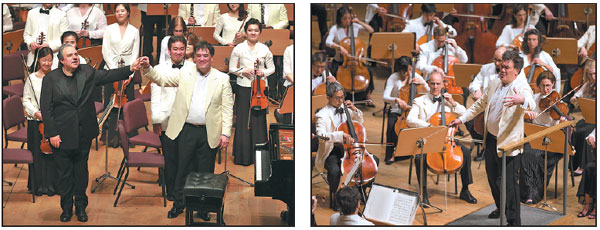Music festival opens in Shanghai with US pianist's work
By Zhang Kun in Shanghai (China Daily) Updated: 2017-07-06 07:33Pianist Yefim Bronfman made his debut in Shanghai at the opening concert of the Music in the Summer Air festival with the New York Philharmonic orchestra on Sunday.
Since 2010, the outdoor music festival has been hosted each year by the Shanghai Symphony Orchestra, aiming to take classical music to a wider audience.
As an influential musician, Bronfman is known for his technique and wide repertoire, ranging from classical Beethoven and Brahms pieces to modern works by composers, such as Magnus Lindberg and Esa-Pekka Salonen, says Gu Chao, a music critic in Shanghai.
|
Left: Pianist Yefim Bronfman (left) and conductor Alan Gilbert at the opening concert of the Music in the Summer Air festival in Shanghai. Right: The New York Philharmonic plays under the baton of Gilbert. Photos Provided to China Daily |
The Israeli-American played Brahms' Piano Concerto No 2 with the New York Philharmonic under the baton of Alan Gilbert at the festival's opening on Sunday.
"He went through the most challenging part with great ease," says Gu.
Li Changying, another music critic from the city, says Bronfman's interpretation was "clear and full of intricacy, and in contrast with his sturdy physique".
Bronfman was born in Tashkent, Uzbekistan, in 1958, and moved to Israel with his family at age 15.
During World War II, lots of outstanding musicians went to Tashkent, the Uzbek capital, and they stayed on after the war had ended. As a result, Tashkent had good music schools, Bronfman told the media in Shanghai about the beginning of his music studies.
It was in 1978 that Bronfman first played with the New York Philharmonic, alongside Chinese-American cellist Yo-Yo Ma. In the next year, he played with famous conductor Zubin Mehta for the orchestra's new season opening.
Bronfman is active in the international scene, playing concerts, recordings and collaborating with other instrumentalists and modern composers. He won a Grammy in 1997.
"You have to remind yourself it is a privilege to be a musician, and be an ambassador of music," Bronfman says, "because without music, we would be living in a jungle."
He says he was happy to see a large number of young people at the Shanghai festival. Classical music can be a complex language. When he was 17, he didn't understand "the language of Brahms" but kept practicing the pieces.
"Some composers you can relate to more easily, like Tchaikovsky, Rachmaninoff, Mozart and Schubert," he says.
Even for the audience, the melody is often the best way to understand the music, he says.
Bronfman jokes that he was "very jealous" of Italian tenor Andrea Bocelli, because there were lots of female members in the audience for his concerts.
The pianist went on to compare appreciation for music to wine tasting. It doesn't come right away, he says, "maybe it is a question of growing up and maturing - have your ears evolve."
Through the past decades, Bronfman has met with many musicians from China, from Liu Shikun, to younger artists, such as Lang Lang and Yuja Wang.
"They were already great musicians when they landed in the US," he says.
"They must have (had) great teachers in China to teach them."
He declined to give advice to aspiring musicians in the country, although he did share his experience collaborating with conductors universally.
"Don't be polite," says the pianist. "Always speak your mind and express your opinion, and the conductor has to do the same."
That way one can get to the bottom of the music, he adds.
This year's Music in the Summer Air festival will go on for two weeks, comprising 25 concerts that will be held at the Shanghai Concert Hall.
The highlights include a joint concert by the New York Philharmonic and the Jazz at Lincoln Center Orchestra with Wynton Marsalis on Friday; Christian Blackshaw playing the complete collection of Mozart's sonatas from Monday to July 13; and Song of Everlasting Sorrow, featuring Chinese bass singer Shen Yang on Sunday.
You can visit misa.org.cn for more details of the festival.
zhangkun@chinadaily.com.cn
- 'Cooperation is complementary'
- Worldwide manhunt nets 50th fugitive
- China-Japan meet seeks cooperation
- Agency ensuring natural gas supply
- Global manhunt sees China catch its 50th fugitive
- Call for 'Red Boat Spirit' a noble goal, official says
- China 'open to world' of foreign talent
- Free trade studies agreed on as Li meets with Canadian PM Trudeau
- Emojis on austerity rules from top anti-graft authority go viral
- Xi: All aboard internet express












